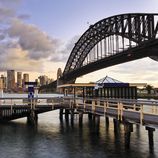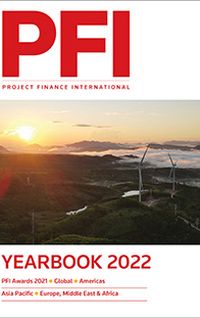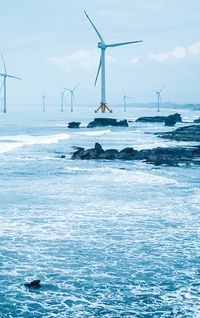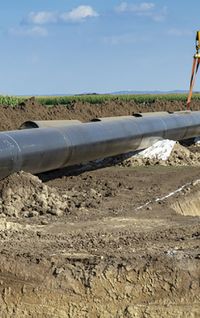Turkey's Kalyon has reached financial close on its 1GW Karapinar YEKA solar farm, with signing taking place on November 12 for the €717m debt package. The project has had to overcome more than most to get over the line. By Peter Collins.
Multiple currency crises, political uncertainty, a partner exit, and a global pandemic managed to slow, but not prevent, the US$812m project financing. November's signing marked the end of a veritable saga for the first ever winner of Turkey's YEKA renewables tender programme.
Kalyon and its then partner, South Korea's Hanwha Q Cells, submitted the lowest bid of US$0.0699 per kWh for the project at Karapınar in the central province of Konya and were awarded the estimated US$1.3bn scheme all the way back in March 2017. The 15-year power purchase agreement would cover a 30-year operating licence. Included in the project scope was the construction of a 500MW solar panel factory that would be operational within 21 months. Strong local content requirements were expected to kick-start an era of Turkish renewables expertise. All was well.
Ground-breaking took place in December 2017 for construction of the PV manufacturing facility in Ankara. In February the following year, it was announced that BNP Paribas and law firm Sherman & Sterling would advise on the financing. South Korea's Kexim and K-Sure were tipped to provide most of the debt, accompanied by Turkish banks and potentially the Islamic Development Bank (IsDB).
Things began to turn south in August 2018, when the Turkish lira plummeted to a record low of TL7.2 to the US dollar –one third of its previous value – causing a shake-up in Turkey's banking and infrastructure sectors, among others. Amid a period of relative political instability in the country, the lira crash exacerbated a number of issues leading to delays, restructurings and cancellations of major infrastructure projects.
Six months later, in February 2019, Hanwha was reported to have sold its shares and exited the project, taking with it the much-needed debt and cover of the South Korean ECAs. Rumours that Kalyon would seek another equity partner failed to materialise, and all was quiet for more than a year during which a second 1GW YEKA solar tender was scrapped in part due to the difficulties facing the first edition. And then Covid hit.
In September 2020, one month after the opening of the US$400m integrated solar cell module factory backed by a state super-incentive of more than US$330m, PFI reported that Kalyon had secured a new group of lenders and was targeting financial close by year-end. JP Morgan had replaced BNP and UKEF was set to come in for its South Korean counterparts. Linklaters had replaced Shearman & Sterling as the sponsor’s legal adviser and Clifford Chance was advising the lenders. Moreover, first generation of the project's first 8MW was imminent. By July this year, it was 217MW operational.
Despite timelines slipping again due to more of the same issues – a lira in freefall, rising material costs due to the pandemic – the financing was finally sealed in November.
UKEF is providing a full guarantee to a US$291m buyer credit facility from JP Morgan, while local lenders Denizbank, Garanti, Işbank, Development Investment Bank of Turkey, Industrial Development Bank of Turkey (TSKB) and VakıfBank are providing the larger chunk of US$500m. The 12-year debt is priced on the commercial side at about Libor plus 550bp, with the covered tranche considerably cheaper. One source put the "all-in" margin, including fees and Libor, at just below 800bp. Capex, adjusted upwards from US$1.1bn over the last year due to rising costs, is about US$1.3bn.
With dollarised offtake payments and loans, plus a basic hedging structure, the effect of the lira crisis on the project was mostly mitigated. “To raise international debt on a project of this kind you have to index to hard currency,” Stephen Le Vesconte, partner at Linklaters, told PFI.
While certainly an important factor, the project tendered in 2017 was not the same as the project that re-emerged in 2020 and a big reason for its revival was the negotiation with the government of improvements to risk allocation, plus the splitting up of the factory and solar plant – thereby reducing further liability for lenders. A 36-month deferral of all major deadlines also gave sponsors and lenders some breathing room and a chance to react to changing market conditions.
With a ready-made panel factory and phased construction timeline, the solar power is also relatively free of equipment and construction risk. At the time of writing, sponsors have already commissioned 550MW of the plant and recently doubled the capacity of the associated solar panel plant to 1GW. The factory is located in the Capital City Organised Industrial Zone in Ankara and was completed with China Electronics Technology Group Corporation (CETC) as a subcontractor.
The strong Turkish presence on the project financing is great news for the country’s banking sector. In 2018, amid the backdrop of a downward spiralling lira and high inflation, several banks, including Garanti, sold billions in project finance loans to foreign lenders to free up cash in response to higher funding costs and pressure to lend more cheaply.
At full capacity in mid-2023 it will actually stand at 1.3GW, with the extra used as a sort of buffer to guarantee delivery of the contracted amounts despite variations in solar exposure and efficiency. Once completed, it will be Europe's largest solar power plant built on a single site and will provide power to two million people.
“Karapinar in particular was great to get done because firstly it’s on a much larger scale than some of the recent YEKA projects and secondly it brings with it a robust international financing, one we hope will be a useful model for future IPPs," said Le Vesconte.
The project was considered hugely ambitious at the time and certainly lived up to that reputation. Turkey even rejigged its YEKA solar tender towards smaller projects partly as a response to Kalyon's tribulations in Karapinar. With that in mind, and amid other concerns over the risk profile, the last YEKA solar tender saw the 1GW of total capacity split into smaller projects of 10MW–20MW. While Kalyon did take home some projects in that tender, it did not bid as aggressively as it is focused on larger-scale projects, including a 1GW wind scheme that it will break ground on soon after completion of this solar financing.
There is certainly plenty more to come in Turkey's renewables sector; and Kalyon is right in the thick of it.
A consortium of Kalyon with Siemens and another Turkish firm, Türkerler, won the auction for the second Renewable Energy Resources Areas (YEKA) project to build 1,000MW of wind power and a turbine factory based in Turkey. The group offered a winning bid of US$0.0348 per kWh, a then record for wind power globally, and one which was met with much market scepticism at the time. The project is expected to be split between 700MW in Thrace, 200MW in Sivas and the rest in Eskisehir. Kalyon will have an opportunity to double up straight away on this major success.
Tenders for advisers to assist in the financing process could go out as soon as Q1 2022. Financing options touted shortly after the tender included export-credit financing from Spanish ECA CESCE, German ECA Euler Hermes and the World Bank’s IFC, though another strong Turkish presence should be needed on what is expected to be a similar sized debt package. Local content requirements aside, there is plenty of appetite in Turkey's commercial banking sector for these types of projects.
The latest YEKA tender, successful by many metrics, is a demonstration in lessons learned and caution applied. Other winners in the last tender include Eksim, Aksa Energy, Cimya, YBT Enerji, and other Turkish companies. Polateliges Enerji, winner of a 10MW project, bid the lowest tariff in one batch of TL197/MWh (US$23.22/MWh), while Margun Enerji equalled that the following day as it brought its total haul in this tender to 90MW. At the start of May this year, developers were awarded 19 of the 76 projects on offer, representing 260MW, but the allocation of the remaining capacity was postponed due to a new Covid lockdown in the country. On the projects that were awarded in that opening week, tariffs averaged TL228.10 per MWh with a lowest bid of TL185/MWh. The ceiling price was set in January at TL0.35/kWh.
Turkey’s Ministry of Energy has since issued a request for expressions of interest (EoIs) for 1.5GW of solar photovoltaic capacity in the country’s next YEKA tender round. Up to 76 projects ranging between 10MW and 30MW will be on offer, with the ceiling price set at TL0.40 (US$0.045) per kWh. Bidders will be expected to pay a convertible sum of TL5m to bid for 10MW projects, TL10m for 20MW projects and TL20m for 30MW projects.
Authorities are also planning a 2GW wind farm tender of 20MW to 100MW schemes and another 1GW solar tender. Germany’s Enercon and Turkey’s Enerjisa were awarded two 250MW onshore wind farms each following the conclusion of the second YEKA wind tender in 2018.
To see the digital version of this report, please click here
To purchase printed copies or a PDF of this report, please email gloria.balbastro@lseg.com

















